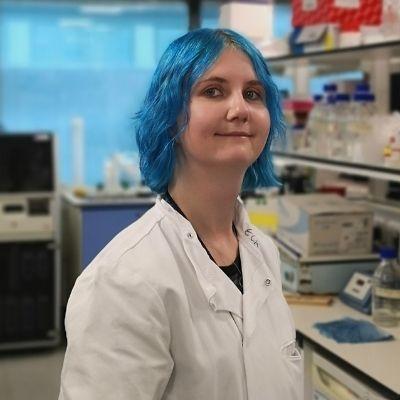Sarah Taylor wins Max Perutz Science Writing Award
Sarah, who is on a Doctoral Training Programme with the Cancer Research UK Edinburgh Centre at IGMM, told us how it feels to see her winning essay published in The Observer: October 2020.

Sarah’s essay ‘Curing the incurable - teaching an old drug new tricks to fight ovarian cancer’ was judged alongside nine other finalists by an expert panel and announced as the winner at an online awards ceremony hosted by the Medical Research Council (MRC).
The competition – named in honour of one of the UK’s most notable scientists and communicators, Dr Max Perutz - drew 140 submissions from MRC PhD students across the UK.
Applicants submitted essays about their research field, discussing why it matters to wider society in engaging and accessible language written for the general public.
This year’s competition was supported by The Observer which published Sarah’s winning entry on Sunday 18 October 2020 and on The Guardian's website.
We recently spoke with Sarah to congratulate her on her award and to learn more about her research and writing.
Congratulations Sarah! How does it feel to win the Max Perutz Science Writing Award?
“It is fantastic to be recognised for this exciting award. Science communication is such an important part of what we do, and I'm really excited to see my work reach a wider audience now it’s published in The Observer!”
Can you tell us a little about what you do at IGMM?
“I am just starting my second year as a PhD student in the CRUK Edinburgh Centre. My work focuses on investigating how DNA repair proteins contribute to chemoresistance in ovarian cancer, and how we can overcome these mechanisms to improve the efficacy of standard chemotherapy. I really enjoy the translational elements of this project, as I hope that one day my work can help to make a positive difference in the lives of ovarian cancer patients.”
What moved you to write about your research?
“My research is definitely a hugely important part of my life, and I want to share what interests me about it, to hopefully inspire others to feel the same! Especially with the current global focus on Covid, it is important to raise awareness of the fact that other diseases, such as ovarian cancer, still claim the lives of huge numbers of people every year, and more research is needed to improve treatment outcomes and save lives.”
What tips or advice do you have for other scientists who would like to get into writing?
“Pick a topic that you are really passionate about, and let your enthusiasm and interest shine through your writing! Even if you feel like you don’t know much about the technical side of writing, you should give it a go, because you might end up surprising yourself. The more you write, and get feedback on your writing, the more you will improve!”
The judges for the 2020 Max Perutz Science Writing Award were:
- Professor Fiona Watt, MRC Executive Chair
- Dr Roger Highfield, MRC Council Member and Science Director of the Science Museum Group
- Andy Ridgway, Journalist and Senior Lecturer in Science Communication at the University of the West of England, Bristol
- Ian Tucker, Science and Technology Editor of The Observer
- Samira Ahmed, Journalist and Broadcaster
Links
- Read Sarah’s winning essay on The Guardian website
- More about the Max Perutz Science Writing Award on the MRC website

